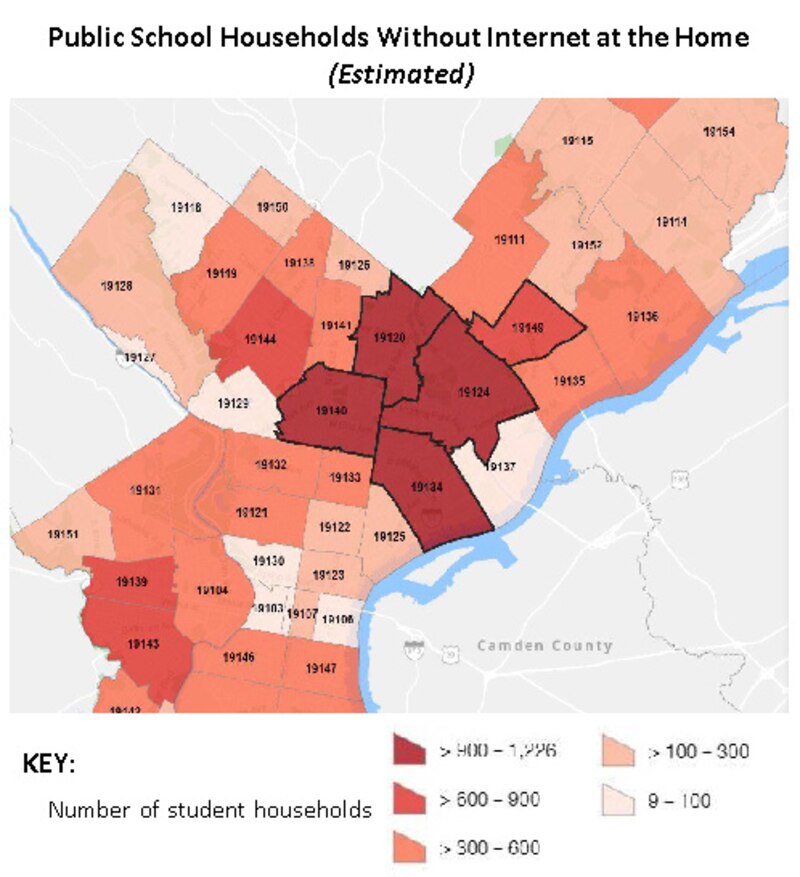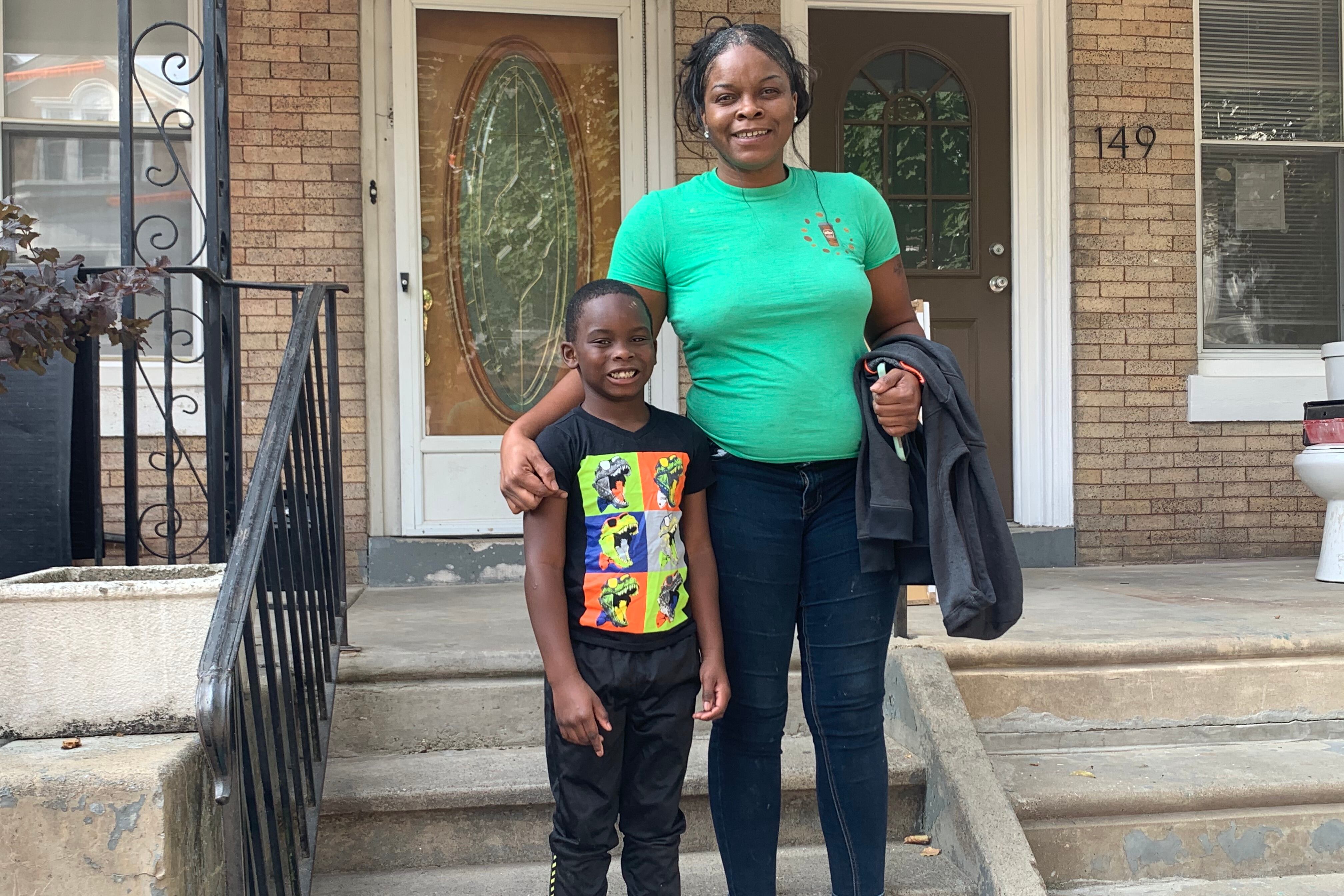Sometimes when Ashley Chalmers Young’s second grader, Zion, tried to do his homework last spring, his mother would get an important phone call, and he’d have to stop.
“All we had was mobile internet,” through her cellular service, Young explained. And in the era of at-home pandemic schooling, this wasn’t sufficient to keep Zion engaged.
Young, who used to drive for Uber and Lyft but hasn’t worked since the onset of COVID-19, has high hopes for Zion, who she calls her “little professor.” She tried to sign up for the low-cost Internet Essentials program through Comcast, but said she could never make it happen, either by going to a Comcast store or calling a phone number she was given. “They were giving me the runaround,” she said. “It was difficult to do what they were asking.”
Young, her husband Antoine and two sons live with her mother Mary, who likes to volunteer at Zion’s school, Philadelphia Hebrew Public Charter in East Falls. One day while there, her mother “mentioned what we were doing to get online and the school was nice enough to loan us an internet box,” Young said.
That box is a mobile hotspot that the school distributed through PHLConnectED, a citywide program that aims to make sure all Philadelphia families have reliable internet access, especially at a time when those without it cannot take advantage of free public education.
City officials told the board of education on Thursday that PHLConnectED is getting off to a slow start. But they expect it to ramp up quickly and officials forecast that 7,400 households will be up and running by the end of September.
“We knew that in the first two, three, four weeks, it would be slow,” said Mark Wheeler, the city’s chief of information technology. “We know from many of our partners that it takes multiple mechanisms to get people to sign up or participate.”
The $17 million, two-year program, funded by a combination of public and philanthropic funds, was announced on Aug. 6 with a goal of signing up 35,000 city households to broadband access within two years. This would happen either by giving them access to Comcast’s Internet Essentials program, or through providing individual T-Mobile hotspots to those for whom that is the best option. This would include homeless families and the housing insecure.
“We are so grateful for this program,” said Emily Hurst, the executive director of Philadelphia Hebrew Public, a new charter in East Falls that has 250 students in grades K-2. “It’s a herculean effort by the city, the philanthropic community and the school district.”
Hurst said so far, the school has handed out 22 hotspots, and has helped “a number” of other families sign up for Internet Essentials, which under PHLConnectED is free for two years.
At Hebrew Public, more than 10 percent of her families had a need, Hurst said. Hotspots have turned out to be a more practical solution for many families, not just the housing insecure, because some students spend their days in multiple households. “Our families are creative and resilient, and a lot of families are piecing together care for their kids,” she said.

Superintendent William Hite has estimated 18,000 city students lack broadband service that is fast enough for doing schoolwork. PHLConnectEd is available to students enrolled in the district, the city’s more than 80 charters, and the Catholic Independence Mission Schools. The district, the individual charters, and the mission schools have all compiled a database of students who potentially qualify for the program, he said.
Using this information the program has reached out to 9,700 households with students who qualify for codes that allow participation in Internet Essentials, Wheeler told the board.
In addition, he said, 1,000 mobile hotspots from T-Mobile have been assigned to eligible students, based on determinations by their school that this is their best option. But he emphasized this doesn’t mean that many have received them.
“This is an eligibility number as opposed to a pickup number,” Wheeler said. “We know from partners who work with families who are under different types of stressors, it does take multiple outreach mechanisms to get them to participate.”
Hite said at Thursday’s board of education meeting that through PHLConnectED, so far 495 have fully connected to the internet, 274 by activating their codes for wired access, and 221 through hotspots. To reach Wheeler’s goal, that means nearly 7,000 people will need to successfully connect in the next two weeks.
Wheeler and Otis Hackney, the city’s chief education officer, are optimistic this will happen.
They told the board that since PHLConnectED started a 211 hotline on Aug. 24 about 2,500 families have called it. Soon, the hotline, run by United Way and available in 150 languages, will be upgraded to not only confirm eligibility, but to directly contact callers to the internet service provider that fits their needs. They are hoping this will help more families actually complete the connection process.
The city is basing its projections for fully connecting thousands more students quickly on the experience in Chicago, Wheeler said, which also started slowly but then saw a surge in participation.
“Chicago also had the same situation, [at first] it was low. After getting the word out...they saw a snowball effect, and we believe we are going to be on the same trajectory,” he said.
Since starting its program in July, Chicago has signed up 25,000 households through its Chicago Connected program, which has a $50 million budget and is organized more centrally than Philadelphia’s effort. Chicago’s big surge occurred in the week before school opened.
Hite has also been in touch with officials in Chicago, where he learned that persistence is key. “It takes multiple touch points, from using the code to getting the internet installed,” he said. “ We will continue that outreach, we have social workers and case workers visiting homes of students we have not heard from.”
One of the obstacles Chicago has faced is skepticism from families that the internet access will be free and they won’t get a bill.
To allay such fears and help families complete the process, another component of PHLConnectEd is the availability of “digital navigators” who can assist with the final steps. People at several nonprofit community organizations providing navigators said that so far, however, the demand for them has been low.
“We are working on doing more on the ground outreach,” said Lois Seffu, the family literacy coordinator at the immigrant advocacy groups SEAMAAC, Inc. “I don’t know, maybe it is still a thing of people not understanding what we’re offering.”
But Seffu and others working in outreach also expect that to change.
Andy Stutzman, who is organizing digital navigators through Drexel University’s ExCITe Center, said he thought there was some confusion over whether those who call the 211 hotline should be forwarded to the navigators. According to Wheeler and Hackney, that is being corrected.
“Everything is moving so quickly, we are working out bumps in the road for that,” Stutzman said. “We are expecting more calls in the near future.”






